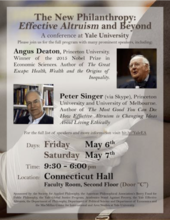Conference Program
(click here for a downloadable version of the program)
FRIDAY MAY 6 2016
Connecticut Hall, 2nd Floor, Faculty Room
8:30am - 9:30am Coffee/tea and pastries
9:30am - 10:00am Welcome and opening remarks
Lisa Fuller and Thomas Pogge
10:00am - 11:45am EA’s Approach Reconsidered
Emily Clough
Iason Gabriel
András Miklós
Moderator: Lea Brilmeyer
11:45am - 1:00pm Lunch
1:00pm - 2:30pm Will MacAskill (via Skype)
Moderator: Jakob Schwab
2:30pm - 2:45pm Coffee/tea break
2:45pm - 4:15pm Sanjay Reddy ’Effective Altruism’: Hamlet Without the Prince?
Moderator: Anat Biletzki
4:15pm - 4:30pm Break
4:30pm - 5:45pm Peter Singer (via Skype)
Moderator: Thomas Pogge
6:00pm - 7:00pm Dinner for speakers and organizers
Saybrook College Fellows’ Lounge, 242 Elm Street
SATURDAY MAY 7 2016
Connecticut Hall, 2nd Floor, Faculty Room
8:30am - 9:30am Coffee/tea and pastries
9:30am - 9:45am Welcome and introduction of the keynote
Lisa Fuller
10:00am - 11:45pm Keynote session: Angus Deaton
Commentator: Jonathan Morduch
Commentator: Rohini Pande
Moderator: Thomas Pogge
11:45pm - 1:00pm Lunch
1:00pm - 2:30pm Judith Lichtenberg Effective Altruism: A Critique
Discussant/Moderator: Lisa Fuller
2:30pm - 2:45pm Coffee/tea break
2:45pm - 4:15pm Human Rights, Humanitarianism and EA
Alice Obrecht
Carrie Santos
Patricia Illingworth
Moderator: Daniele Botti
4:15pm - 4:30pm Break
4:30pm - 6:00pm Challenges for Priority-Setting: Competing Values and Power
Emma Saunders-Hastings
Ted Lechterman
Jakob Schwab
Moderator: Sydney Faught
6:00pm Closing Remarks/Thanks Thomas Pogge
8:00pm - 10:00pm Conference dinner for speakers and organizers
Information about Participants
Click here for information about participants.
Conference Synopsis
Over the past several years there has been a groundswell of support for the philanthropic movement known as “effective altruism,” originally inspired by the work of philosopher Peter Singer. Organizations grounded in this approach to alleviating poverty have proliferated – among them GiveWell, Giving What We Can, 80,000 Hours and the Center for Effective Altruism. Broadly speaking, effective altruism is “a philosophy and social movement which applies evidence and reason to working out the most effective ways to improve the world.” Those individuals and organizations committed to it are especially concerned with saving and bettering the lives of the very poor around the world, in line with Singer’s recommendations in his 1972 article “Famine Affluence and Morality.” Certainly, the effective altruism movement is an exceptional example of how social change can be motivated by work in applied philosophy. The robust public and nonprofit support for this approach is surely positive in the sense that many individuals are now convinced not only that they should give to those less well-off than themselves, but also that they should be concerned about how efficiently their money is being used to achieve this goal. This movement has motivated many people to give and so has raised large sums of money for projects that benefit the global poor. Indeed, effective altruism has emerged as the new model of how to lead an ethical life as a well-off individual.
Nevertheless, many elements of the movement have yet to be subjected to proper critical scrutiny, including: 1. how it can avoid bias in favor of interventions that are easy to measure, 2. how to characterize those improvements for which it is difficult to isolate a single causal factor, 3. how non-consequentialist values such as the values of solidarity, political participation and the priority concern for harm avoidance can be integrated into such an account, and 4. the appropriateness of using tools for measurement such as Quality-Adjusted-Life-Years and Disability-Adjusted-Life-Years – which were developed for a very different purpose – in the context of international development and humanitarian projects. In addition, there is also the larger question of whether supporting private, individual interventions or “lifestyle choices” as a solution to a global poverty is justifiable in light of the clear need for lasting institutional economic reforms designed to achieve this goal. The central purpose of the conference is to subject both the theoretical and practical aspects of the movement to economic, political and philosophical assessment, and thereby (hopefully) to enrich elements of its theory and concrete execution.
To that end, the conference brings together academics (from economics, political science and philosophy) as well as representatives of funding bodies, policymakers and NGO practitioners. The conference is genuinely interdisciplinary and includes multiple perspectives from each constituency. The time is ripe for an in-depth assessment of this transformation of philanthropic endeavors and its potential to radically change the lives of many of the global poor in the coming years.
The keynote speaker is Professor Angus Deaton, Dwight D. Eisenhower Professor of Economics and International Affairs at the Woodrow Wilson School of Public and International Affairs and the Economics Department at Princeton University. His research focuses on the determinants of health in rich and poor countries, as well as on the measurement of poverty in India and around the world. He has recently written on the topic of effective altruism and its relationship to poverty alleviation in the Boston Review. He was awarded the 2015 Nobel Memorial Prize in Economic Sciences for his analysis of consumption, poverty, and welfare.
In addition, Professor Peter Singer, Ira W. DeCamp Professor of Bioethics at Princeton University, and a Laureate Professor at the Centre for Applied Philosophy and Public Ethics at the University of Melbourne, joins us from Australia via Skype.
The conference is sponsored by: the Society for Applied Philosophy, the American Philosophical Association’s Berry Fund for Public Philosophy, the Yale Global Justice Program, Academics Stand Against Poverty, the Yale Effective Altruists, the Department of Philosophy, Department of Political Science and Department of Economics and the MacMillan Center for International and Area Studies at Yale University.

